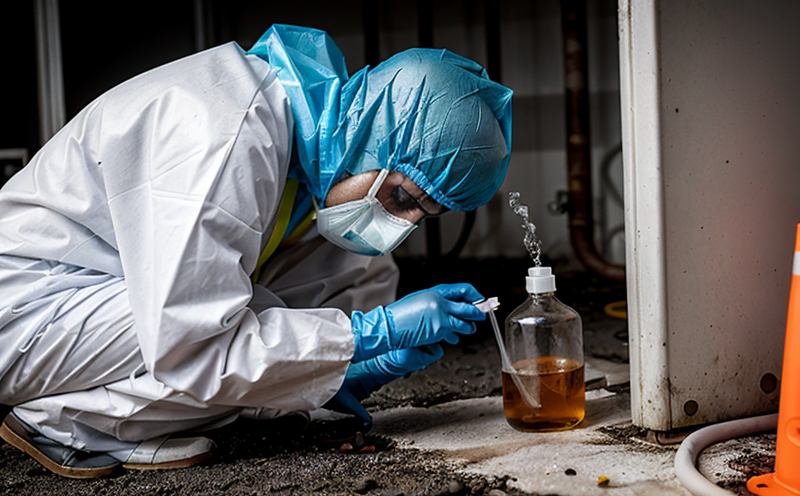ASTM D1976 Analysis of Sulfur in Metallic Materials
The ASTM D1976 standard method is a widely recognized procedure used to determine the sulfur content in metallic materials. This test is particularly important in sectors where material purity, performance, and durability are critical factors. Sulfur can have significant impacts on the mechanical properties of metals, such as reducing strength and increasing brittleness when present in high concentrations.
Metals like steel, aluminum alloys, brass, and copper are susceptible to sulfur contamination during various stages of their production processes. ASTM D1976 provides a reliable method for identifying these contaminants early on, ensuring that materials meet the specified quality standards set by industry regulations and customer requirements.
The testing procedure outlined in ASTM D1976 involves dissolving the sample using nitric acid and perchloric acid. The sulfur content is then determined through colorimetric analysis. This method ensures accurate results with a precision of ±0.2% for total sulfur content above 0.5%. For lower concentrations, the accuracy can vary depending on the specific analytical technique used.
Our laboratory adheres strictly to this standard when performing ASTM D1976 tests. Specimens are prepared according to industry best practices, ensuring that they represent the true nature of the material being tested. Our highly experienced technicians use state-of-the-art equipment such as flame atomic emission spectroscopy (FAES) and inductively coupled plasma optical emission spectrometry (ICP-OES).
The results from ASTM D1976 analysis play a crucial role in quality assurance programs, helping manufacturers identify potential issues before they affect the final product. By detecting sulfur impurities early on, companies can take corrective actions to prevent costly recalls and rework.
- Quality Assurance: Ensures compliance with industry standards and customer specifications.
- Durability Improvement: Eliminates sulfur-induced weaknesses in metallic components.
- Cost Efficiency: Prevents the need for costly repairs or replacements of defective products.
In summary, ASTM D1976 is an essential tool for ensuring high-quality metallic materials. By adhering to this standard, we provide our clients with accurate and reliable data that contributes significantly to their overall product quality assurance efforts.
Eurolab Advantages
At Eurolab, we pride ourselves on offering unparalleled expertise in ASTM D1976 analysis. Our team of highly trained professionals ensures precision and accuracy in every test conducted according to this standard.
- Global Recognition: We follow the latest international standards to ensure our results are internationally recognized and respected.
- State-of-the-Art Equipment: Utilizing advanced analytical instruments like FAES and ICP-OES guarantees precise measurements.
- Comprehensive Reporting: Detailed reports provide insights into not only the sulfur content but also any other relevant findings.
- Client Satisfaction: Our commitment to excellence has earned us a reputation for delivering accurate, reliable results consistently.
We understand that time is of the essence when it comes to quality assurance. That's why we offer fast turnaround times while maintaining our high standards.
Why Choose This Test
The importance of ASTM D1976 analysis cannot be overstated, especially in industries where material integrity and performance are paramount. Here’s why you should consider this test:
- Material Integrity: Ensures that sulfur contamination does not compromise the strength or durability of metallic components.
- Regulatory Compliance: Helps meet industry-specific regulations regarding material purity.
- Risk Mitigation: Identifies potential issues early, minimizing risks associated with defective materials.
- Cost Savings: Avoids costly rework and replacements by catching problems before they become critical.
By choosing ASTM D1976 analysis from Eurolab, you gain access to a comprehensive suite of testing services designed specifically for your industry needs. Our experienced staff works closely with clients to understand their unique requirements and deliver tailored solutions.
Quality and Reliability Assurance
Ensuring the quality and reliability of metallic materials is critical in many sectors, including automotive, aerospace, and manufacturing. Here’s how ASTM D1976 contributes to this:
- Precision Measurement: Using flame atomic emission spectroscopy (FAES) and inductively coupled plasma optical emission spectrometry (ICP-OES), we provide highly accurate measurements.
- Repeatable Results: Our rigorous adherence to ASTM D1976 ensures consistent, repeatable results across multiple tests.
- Compliance Verification: Confirm that your materials meet the required standards and specifications set by industry regulations.
- Risk Management: Identify potential risks early on, allowing for timely interventions to maintain quality standards.
The precision of ASTM D1976 analysis is crucial in maintaining the integrity and reliability of metallic components. By detecting sulfur contamination at an early stage, we help prevent costly defects that could arise later in the manufacturing process.





